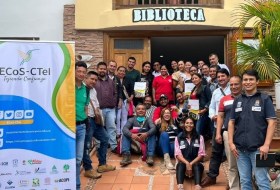News
The ECOS-CTei project identifies ideas in science, technology, and innovation in the Caucan subregions.
Under inclusion and co-creation criteria, ECOS-CTei carried out a TerriLab in the municipality of Páez-Belalcázar, where researchers from the University of Cauca, together with key actors from social, productive, educational, and governmental sectors, identified strategies for the adoption of scientific, technological, and innovative developments.
The ECoS-CTei project continually aims to have a greater impact on strengthening governance in the subregions to promote science, technology, and innovation (STI). This is to ensure that future programs and projects in this sector incorporate initiatives generated in citizen participation scenarios, based on the identification and prioritization of the issues that most affect their community.
This is how, on May 30, the technical team of the Governance component for STI of the project moved to the municipality of Páez-Belalcázar to conduct the TerriLab (co-creation laboratories) where priority ideas in Science, Technology, and Innovation were identified by key actors from the social, productive, educational, and governmental sectors.
"The presence in different municipalities of the 7 subregions of Cauca aims to highlight the needs and possible solutions to the social, economic, and environmental issues of historically marginalized communities. The workshop is a space for citizen participation that seeks to have an impact on the decisions of public policy taken in municipalities regarding Science, Technology, and Innovation, thus contributing to strengthening the STI ecosystem of the department of Cauca," mentioned Professor Juliana Sarmiento, affiliated with the Department of Economics of the University of Cauca and co-director of the project.
The ECOS-CTei project invites different actors from the municipalities of Timbiquí, La Vega, San Sebastián, and finally, Popayán, to participate in the upcoming TerriLabs. They will be summoned to collectively establish a direction for STI in the Cauca department for the next decade.
Likewise, it invites all adults residing in any municipality of Cauca to complete the following citizen consultation. The objective is to understand how science, technology, and innovation can help address the challenges and problems of Cauca, aiming for better living conditions for all its inhabitants. Prizes are drawn weekly among the participants.


